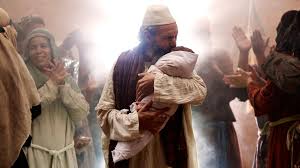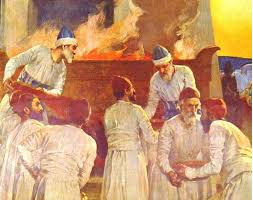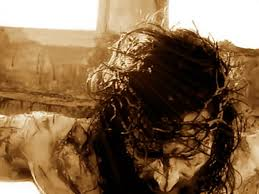Ap – ஜோசப் இயேசுவை தன் மகனாக ஏற்றுக்கொண்டார் மத்தேயு 1:18-25
ஜோசப் இயேசுவை தன் மகனாக ஏற்றுக்கொண்டார்
மத்தேயு 1:18-25
ஜோசப் இயேசுவை தனது மகன் டிஐஜியாக ஏற்றுக்கொள்கிறார்: மேரி எப்படி ஜோசப்பிடம் தன் கர்ப்பத்தை விளக்க முடியும்? நீங்கள் யோசேப்பின் இடத்தில் இருந்தால் எப்படி உணருவீர்கள்? உங்கள் குடும்பத்தினருக்கும் நண்பர்களுக்கும் என்ன சொல்வீர்கள்? இறைவனுக்கு? அவரது விருப்பங்கள் என்ன? இயேசு ஏன் பிறந்தார் என்பதற்கு மத்தேயு என்ன காரணங்களைக் கூறுகிறார்? தீர்க்கதரிசனத்தை நிறைவேற்றுவதைத் தவிர, இயேசுவின் கன்னிப் பிறப்பு ஏன் அவசியம்?
பிரதிபலிப்பு: உங்கள் வாழ்க்கையில் யேசுவா ஹா’மேஷியாக்கை இம்மானுவேலாக நீங்கள் எப்படி அனுபவித்தீர்கள்? ஜோசப்பிடமிருந்து விசுவாசத்தைப் பற்றி நீங்கள் என்ன கற்றுக்கொள்கிறீர்கள்? கர்த்தரின் பெரிய நோக்கங்களுக்கு அடிபணிவது பற்றி ஜோசப்பிடம் இருந்து நீங்கள் என்ன பாடங்களைக் கற்றுக்கொள்ளலாம்? கர்த்தர் எப்போது உங்களுக்கு மிகவும் உண்மையானவராகவும், மிகவும் உறுதியானவராகவும், மிக நெருக்கமானவராகவும் தோன்றினார்?
யேசுவாவின் பரம்பரை அவர் மேசியாவாக இருப்பதற்கான அளவுகோல்களை பூர்த்தி செய்துள்ளது என்பதை சரிபார்த்த மத்தேயு இப்போது சுமார் 2000 ஆண்டுகளுக்கு முன்பு இஸ்ரேலில் அவர் பிறந்த உண்மையான நிகழ்வுகளுக்கு திரும்புகிறார். மேரியின் கதையில் பின்னிப்பிணைந்த இன்னொரு கதை சொல்லப்பட காத்திருக்கிறது. நிஜ வாழ்க்கையைப் போலவே மதக் கலைப்படைப்புகளிலும், ஜோசப் மற்றும் ஜூட் இரண்டு வகையானவர்கள் (ஜூட் பற்றிய எனது வர்ணனையைப் பார்க்கவும், இணைப்பைக் காண Ae – ஜூட், இயேசு கிறிஸ்துவின் அடிமை). அவரது பிரபலமான சகோதரர் ஜேம்ஸ் மற்றும் அவரது ஒன்றுவிட்ட சகோதரர் இயேசு யூதாவை கிரகணம் செய்தார்கள். ஜோசப் மிரியமுக்கு அடுத்த நிழலில் நிற்கிறார், அவர் தனது குழந்தையுடன் கிறிஸ்துமஸ் அட்டைகளில் சிறப்பிக்கப்படுகிறார். அவர் எப்போதும் ஆடு மேய்ப்பவர்களுடன் கலந்து பேசுவது போல் தெரிகிறது. ஜூட்டைப் போலவே, கதையின் உண்மையான நட்சத்திரத்திற்கான வார்ம்-அப் இசைக்குழுவாக இருப்பது எப்படி என்பதை அவர் அறிந்திருந்தார். இருப்பினும், ஓரங்களில் உள்ள மறந்த மனிதன் மேரியின் கதையில் பெரிதாகத் தோன்றுகிறான்.
அவர் ஒரு நம்பமுடியாத மனிதர். அவரும் மேரியும் திருமண விழாவின் முதல் கட்டத்திற்குள் நுழைந்தனர் (பார்க்க Al – மேரிக்கு முன்னறிவிக்கப்பட்ட இயேசுவின் பிறப்பு). அவர்கள் பொது உறுதிமொழிகளை பரிமாறிக்கொண்டனர், ஹப்பா அல்லது விதானத்தின் கீழ் முதல் கோப்பை மதுவை எடுத்துக் கொண்டனர், மேலும் ஒரு வருட நிச்சயதார்த்த காலத்திற்குள் நுழைந்தனர். சமூகத்தின் பார்வையில் அவர்கள் “திருமணமானவர்கள்” – ஆனால் பாலியல் தொடர்பு இல்லாமல். மேரியின் கர்ப்பத்தைப் பற்றிய அதிர்ச்சியூட்டும் செய்தியை அறிந்துகொண்ட அவரது பதில், அவர் எவ்வளவு அசாதாரணமானவர் என்பதை நிரூபித்தது. உண்மைகளின் அடிப்படையில், மிரியம் அவருக்கு துரோகம் செய்து தனது சபதத்தை மீறினார். சூழ்நிலையின் கீழ், ஜோசப் கோபமாக அல்லது பழிவாங்கும் வகையில், கசப்பாகவும் இருக்க நியாயமான உரிமையைப் பெற்றிருந்தார். அவளை நீதியின் முன் நிறுத்த அவருக்கு சட்டப்பூர்வ உரிமை இருந்தது. ஆனால், நாம் பார்ப்பது போல், யோசேப்பு அப்படிப்பட்ட மனிதர் அல்ல. ADONAI தனது இதயத்தில் ஒரு வேலையைச் செய்திருந்தார். அவர் ஒரு நீதியுள்ள மனிதர், கடவுளின் பார்வையில் சரியானதைச் செய்ய வேண்டும் என்ற நோக்கத்தில் இருந்தார், அது அவருக்கு என்ன விலை கொடுத்தாலும் சரி.88
ஜோசப்பின் பார்வையில் இருந்து கதையை மத்தேயு கூறுகிறார். மேசியாவாகிய இயேசுவின் பிறப்பு இப்படித்தான் வந்தது: அவருடைய தாயார் மரியா யோசேப்புடன் திருமணம் செய்து கொள்வதாக உறுதியளித்தார், ஆனால் அவர்கள் கூடுவதற்கு முன்பு, அவர் பரிசுத்த ஆவியின் மூலம் கர்ப்பமாக இருப்பது கண்டறியப்பட்டது (மத்தேயு 1:18). கன்னிப் பிறப்புக்கு முக்கியத்துவம் கொடுக்கப்பட்டது, ஏனென்றால் மட்டித்யாஹு ஜெகோனியாவின் பிரச்சனையைத் தீர்க்க முயல்கிறார் (Ai – ஜோசப் மற்றும் மேரியின் மரபியல்களைப் பார்க்கவும்). மூன்று வெவ்வேறு சந்தர்ப்பங்களில் கன்னிப் பிறப்பு வலியுறுத்தப்படுகிறது. மத்தேயு 1:18 இல் ஈர்க்கப்பட்ட மனித ஆசிரியர் பதிவு செய்கிறார்: அவர்கள் ஒன்றாக வருவதற்கு முன்பு; மட்டித்யாஹு 1:22-23 இல் அவர் ஏசாயா 7:14 ஐ மேற்கோள் காட்டுகிறார்: கன்னிப் பெண் குழந்தையுடன் இருப்பாள், மூன்றாவதாக, மத்தேயு 1:25 இல் அவள் ஒரு மகனைப் பெற்றெடுக்கும் வரை எந்த ஒரு உறவும் இல்லை என்று கூறுகிறார்.
எனவே, மரியாள் நாசரேத்தில் உள்ள வீட்டிற்குத் திரும்பியபோது, தன் கணவனைப் பார்த்தாள். மூன்று மாதங்களுக்கு அவள் தன்னிடமிருந்து விலகி இருக்கத் தேர்ந்தெடுத்ததில் அவன் மகிழ்ச்சியடையவில்லை, அந்த ரகசியம் அவனுக்குத் தெரிந்தால், அவன் அதை நன்றாக மறைத்தான். எலிசபெத் கர்ப்பமாக இருப்பதாக மிரியமின் தாயிடமிருந்து அவர் கேள்விப்பட்டிருந்தார், ஆனால் நிச்சயமாக அவளுடைய ஊரில் அவளைக் கவனித்துக்கொள்ளக்கூடிய வேறு பெண்கள் இருந்தார்கள். இளம்பெண் ஜோசப்பிடம் இதுபற்றி வாக்குவாதம் செய்யவில்லை. அவனது மனோபாவத்தில் இருந்து, அவனுக்கு பெரிய ரகசியம் எதுவும் தெரியாது என்று அவள் முடிவு செய்திருக்கலாம். ஆனால், சந்தேகத்திற்கு இடமின்றி, அவள் கர்ப்பமாக இருந்ததைச் சொல்லாமல், யோசேப்பைத் திருமணம் செய்து கொள்ளமாட்டேன் என்று உறுதியளித்தாள். எனவே, அவள் அதை செய்ய முடிவு செய்தாள். அவளுடைய விளக்கத்தை அவர் நம்பவில்லை என்றால், அவர் எப்படியும் ஒரு பொருத்தமான மாற்றாந்தாய் இருக்க மாட்டார். இதைவிட சிறந்த வழி கண்டுபிடிக்க முடியாது. எனவே, அவள் அவனிடம் சொன்னாள்.
“நான் ஒரு குழந்தையைப் பெறப் போகிறேன்,” என்று அவள் சொன்னாள். இது ஜோசப்பை மையமாக உலுக்கியிருக்க வேண்டும். அவள் மிகவும் விசுவாசமாகவும் அப்பாவியாகவும் தோன்றினாள். கன்னிப் பெண் உடலுறவு கொள்ளாமல் குழந்தை பெறுகிறாளா? நம்பமுடியாது! அவர் என்ன தவறவிட்டார்? மூன்று மாதங்களாகப் போய்விட்டு வந்தாள் கர்ப்பமாக !
இந்த இரு இளம் காதலர்களின் இதயங்களிலும் சோகத்தின் ஆழத்தை கற்பனை செய்து பார்க்க முடியாது. அவன் அவளை மென்மையாகப் பார்த்தான், ஆனால் அவள் எந்த விளக்கமும் அளிக்கவில்லை. எல்லா சாத்தியக்கூறுகளிலும் அவள் அவனிடமிருந்து விலகிப் பார்த்து, அவனிடம் எல்லாவற்றையும் சொல்ல வேண்டும் என்று விரும்பினாள். குழந்தைக்கு ஒரு மாற்றாந்தாய் தேவைப்படுவார் – அவள் நேசித்த, மென்மையான, அர்ப்பணிப்பு மற்றும் பொறுமையான ஜோசப்பை விட சிறந்தவர் யார்? யாருக்குத் தெரியும், இந்தக் காரணங்களுக்காகவே அவர் அந்தக் கதாபாத்திரத்திற்குத் தேர்ந்தெடுக்கப்பட்டிருக்கலாம். எப்படியிருந்தாலும், அவர் தனது மகனான ராஜாவுக்கு சரியான பாதுகாவலராக இருப்பார். அவளிடம் சாப்பிட வேண்டிய கேள்வி இதுதான், “ஏன்? ஏன் அவரிடம் சொல்லப்படவில்லை?” ஆனால் அவளுடையது கேள்வி கேட்பது அல்ல, அவள் நம்புவதும் கீழ்ப்படிவதும் ஆகும். அவள் சந்தேகத்தில் உட்கார மாட்டாள்.
யோசிக்க ஜோசப் விலகிச் செல்ல வேண்டியிருந்தது. அவன் பக்கத்தில் இருந்தான் குழப்பமாக இருந்தான். இது எப்படி நடந்தது? அவர் மிகவும் உறுதியாக இருந்தார்! அவர் அவளை முழு மனதுடன் நேசித்தார் மற்றும் அவருடன் நீண்ட மற்றும் பலனளிக்கும் வாழ்க்கையின் தரிசனங்களைக் கொண்டிருந்தார். ஆனால், இப்போது அவர் துரோகம் செய்துவிட்டதாக உணர்ந்தார், அவரால் அதை புரிந்து கொள்ள முடியவில்லை. அவர் விஷயங்களைக் கண்டுபிடிக்கும் போது அவர் அந்த மோசமான செய்தியை தனக்குள்ளேயே வைத்திருந்தார்.
அவர் என்ன செய்ய முடியும்? சமூகத்தின் வாயிலில் உள்ள பெரியவர்களிடம் பேசி அவளை பகிரங்கமாக விவாகரத்து செய்யலாம். அப்படிச் செய்தால் மிரியம் கர்ப்பமா என்று கேட்பார்கள். அவள் ஆம் என்று சொன்னால், யோசெப் தான் தந்தை இல்லை என்று சத்தியம் செய்ய வேண்டும். வாய்வழி சட்டம் (பார்க்க Ei – வாய்வழி சட்டம்) நான்கு வகையான மரண தண்டனையை ஈர்ப்பு விசையின் கீழ் வரும் வரிசையில் குறிப்பிடுகிறது: கல்லெறிதல், எரித்தல், தலை துண்டித்தல் மற்றும் கழுத்தை நெரித்தல் (சந்ஹெட்ரின் 7:1). நிச்சயிக்கப்பட்ட பெண்ணுடன் உடலுறவு கொள்ளும் ஆண், தன் தாயுடன் உடலுறவு கொள்பவன், கல்லெறிதல் போன்ற தண்டனைக்கு உட்படுவான் (சங்ஹெட்ரின் 7:4). மற்றொரு ஆணின் மனைவியுடன் உடலுறவு கொள்ளும் ஒருவர் கழுத்தை நெரித்து கொல்லப்படுவார் (சன்ஹெட்ரின் 11:1)89 நிச்சயமாக, ரோம் ஆதிக்கம் செலுத்திய இந்த காலகட்டத்தில் யூத நீதிமன்றங்கள் மரண தண்டனையை நிறைவேற்ற முடியாது, மேலும் இந்த நேரத்தில் மரண தண்டனையை நிறைவேற்ற முடியாது. அனுமதிக்கப்பட்டாலும் கூட. ஆயினும்கூட, அவளுடைய திருமணத்திற்கு முந்தைய கர்ப்பம் அவள் மீண்டும் திருமணம் செய்து கொள்வதற்கான எந்த வாய்ப்பையும் அழித்திருக்கக்கூடும். பொருளாதார ரீதியாக ஆண்களை மையமாகக் கொண்ட சமூகத்தில் இது ஒரு பயங்கரமான விதியாகும், அங்கு ஒரு பெண்ணின் மரியாதை ஒரு ஆணுடன் அவள் அந்தஸ்தைப் பொறுத்தது. 90 இருப்பினும், மற்றொரு விருப்பம் இருந்தது. அவர் அவளுக்கு விவாகரத்து சான்றிதழை எழுதி, அவளை அமைதியாக தனது வீட்டிலிருந்து அனுப்ப முடியும் (உபாகமம் 24:1).91 இது ஒரு தனிப்பட்ட ஏற்பாடாக இருக்கும், பொது அவதூறு அல்ல. அவர் உண்மையில் இரண்டு விருப்பங்களையும் வெறுத்தார்.
பெரும்பாலான நவீன மேற்கத்திய கலாச்சாரத்திற்கு மாறாக, யோசெப் ஒரு சமூகத்தில் வாழ்ந்தார், அங்கு மேரிக்கு இரண்டாவது வாய்ப்பு கொடுக்க அவருக்கு விருப்பம் இல்லை. . . அவர் விரும்பினாலும். வாய்வழி சட்டம் ஒரு ஆண் தன் மனைவி கன்னியாக இருக்கவில்லை என்பதைக் கண்டுபிடித்தவுடன் உடனடியாக அவள் மீது குற்றஞ்சாட்ட வேண்டும் என்று கோரியது. விபச்சாரத்தை இறுதியான திருட்டு என்று கருதும் உலகில் – மற்றொரு ஆணின் விலைமதிப்பற்ற உடைமைகளை திருடுவது, அவரது மனைவியின் பிரிக்கப்படாத பாசம், விபச்சாரத்திற்கான உணர்ச்சிபூர்வமான பதில் பெரும்பாலும் மிகவும் தீவிரமானது. ஒரு மனைவியின் விபச்சாரம் கணவனின் போதாமை அல்லது அவரது குடும்பம் ஒரு துணையைத் தவறாகத் தேர்ந்தெடுப்பதைக் குறிக்கும் என்பதால், அது கணவனையும் அவமானப்படுத்தியது. இவ்வாறு, மிர்யாமின் வெளிப்படையான துரோகமும் அவருக்கு அவமானத்தைத் தந்தது.92
அவர் படுக்கையில் இரவு முழுவதும் தூக்கி எறிந்தார். அவனால் அதைப் பற்றி சிந்திப்பதை நிறுத்த முடியவில்லை. அவன் என்ன செய்வான்? களைத்துப்போய் கடைசியில் தன் முடிவை எடுத்தான். யூத திருமண விழாவின் முதல் கட்டத்தின் விதிமுறைகளின்படி அவளுடைய “கணவன்” ஜோசப் ஒரு நீதியுள்ள மனிதனாக இருந்ததால், அவளை பொது அவமானத்திற்கு ஆளாக்க விரும்பவில்லை, அவன் அவளை அமைதியாக விவாகரத்து செய்ய முடிவு செய்தான் (மத் 1:19). அது அவரது இதயத்தை உடைக்கும், ஆனால் அது நீதியாகவும் அதே நேரத்தில் இரக்கமாகவும் இருக்கும்.
முடிவு வந்த சில நொடிகளில் அவர் நிம்மதி அடைந்தார். அதனால் நிம்மதியாக உறக்கத்தில் மூழ்கினார். ஆனால் அவர் இந்த முடிவுக்கு வந்த பிறகு, கர்த்தருடைய தூதர் அவருக்கு ஒரு கனவில் தோன்றினார், இது கடவுளின் தயவின் அடையாளமாக கருதப்பட்டது (மத்தேயு 1:20a). இறைவனின் தயவைக் குறிக்கும் மூன்று விஷயங்களில் (மற்ற இரண்டும் நல்ல அரசன் மற்றும் பலனளிக்கும் ஆண்டு) ஒரு நல்ல கனவு என்று ரபீக்கள் கற்பித்தார்கள். இந்த நம்பிக்கை மிகவும் பிரபலமாக இருந்தது, அது ஒரு பிரபலமான பழமொழியாக வளர்ந்தது: யாரேனும் ஏழு நாட்கள் தங்கள் கனவை விளக்கமாக நினைவில் வைத்துக் கொள்ளாமல் தூங்கினால், அவர்களை தீயவர்கள் மற்றும் ஹா’ஷெம் நினைவில் கொள்ளாதவர்கள் என்று அழைக்கவும்.93
இந்த தேவதூதன் கூறினார்: தாவீதின் குமாரனாகிய யோசேப்பு, மரியாளை உனது மனைவியாக வீட்டிற்கு அழைத்துச் செல்ல பயப்படாதே, ஏனென்றால் அவளில் கருவுற்றது பரிசுத்த ஆவியின் மூலம் (மத்தேயு 1:20b). இயேசுவுக்கு மனித தந்தை இல்லை, ஆனால், அவருக்கு ஒரு மனித தாய் இருந்தார். அப்போதுதான் மேசியா கடவுள்-மனிதனாக இருக்க முடியும். இது அவதாரத்தின் மிகவும் இயல்பான மற்றும் எளிதான விளக்கமாகும் (இந்த வார்த்தை லத்தீன் வார்த்தையிலிருந்து எடுக்கப்பட்டது, அதாவது மாம்சத்திற்குள் நுழைவது அல்லது மாம்சமாக மாறுவது என்று பொருள்).94 நமது முழு நம்பிக்கையும் அதன் மீது கட்டப்பட்டுள்ளது. நற்செய்தியின் சாராம்சமும் சக்தியும் என்னவென்றால், கடவுள் மனிதனானார், அவர் முழு கடவுளாகவும் முழு மனிதனாகவும் இருப்பதால், மனிதகுலத்தை கடவுளுடன் சமரசம் செய்ய முடிந்தது. யேசுவாவின் கன்னிப் பிறப்பு, சிலுவையில் அவரது மாற்று மரணம், அவரது உயிர்த்தெழுதல், விண்ணேற்றம் மற்றும் உடல் திரும்புதல் அனைத்தும் அவரது தெய்வீகத்தின் பின்னிப்பிணைந்த அம்சங்களாகும். அவை ஒன்றாக நிற்கின்றன அல்லது விழுகின்றன.
TaNaKh ஐ அறிந்த மற்றும் நம்பிய யூதர்களுக்கு கன்னிப் பிறப்பு ஆச்சரியமாக இருக்கக்கூடாது. எரேமியா 31:22-ல் ஒரு பெண் ஒரு மனிதனைச் சூழ்ந்து கொள்வாள்என்ற சொற்றொடரின் தவறான விளக்கத்தின் விளைவாக, மேசியாவுக்கு அசாதாரண பிறப்பு இருக்கும் என்று பல ரபீக்கள் கற்பித்தனர். அவருக்கு பூமிக்குரிய தந்தை இல்லை என்று சொன்னார்கள். மேஷியாக்கின் பிறப்பு கர்த்தரின் பனியைப் போலவும், ஒரு மனிதனின் செயல் இல்லாமல் புல் மீது துளிகள் போலவும் இருக்கும் என்று அவர்கள் கற்பித்தனர். எனவே பல ரபிகள் கூட யேசுவாவிற்கு ஒரு தனித்துவமான பிறப்பைக் கருதினர்.95
 அவர் ஒரு குமாரனைப் பெற்றெடுப்பார், தேவதை தொடர்ந்தார், நீங்கள் அவருக்கு இயேசு என்று பெயரிட வேண்டும், ஏனென்றால் அவர் தம் மக்களை அவர்களின் பாவங்களிலிருந்து காப்பாற்றுவார் (மத்தித்யாஹு 1:21). அவர் காப்பாற்றுவார் என்பதற்கான ஹீப்ரு வார்த்தை யோஷியா, இது யேசுவா (யுட்-ஷின்-வாவ்-அயின்) என்ற பெயரின் அதே எபிரேய மூலத்தை (யுட்-ஷின்-அயின்) கொண்டுள்ளது. இவ்வாறு இயேசுவின் பெயர் அவர் என்ன செய்வார் என்பதன் அடிப்படையில் விளக்கப்படுகிறது. உண்மையில், யேசுவா என்ற பெயர் Y’hoshua அல்லது யேசுவா என்ற எபிரேய பெயரின் சுருக்கமாகும், அதாவது YHVH காப்பாற்றுகிறார். இது இரட்சிப்பு என்று பொருள்படும் யேசுவா என்ற எபிரேய வார்த்தையின் ஆண்பால் வடிவமாகும்.96
அவர் ஒரு குமாரனைப் பெற்றெடுப்பார், தேவதை தொடர்ந்தார், நீங்கள் அவருக்கு இயேசு என்று பெயரிட வேண்டும், ஏனென்றால் அவர் தம் மக்களை அவர்களின் பாவங்களிலிருந்து காப்பாற்றுவார் (மத்தித்யாஹு 1:21). அவர் காப்பாற்றுவார் என்பதற்கான ஹீப்ரு வார்த்தை யோஷியா, இது யேசுவா (யுட்-ஷின்-வாவ்-அயின்) என்ற பெயரின் அதே எபிரேய மூலத்தை (யுட்-ஷின்-அயின்) கொண்டுள்ளது. இவ்வாறு இயேசுவின் பெயர் அவர் என்ன செய்வார் என்பதன் அடிப்படையில் விளக்கப்படுகிறது. உண்மையில், யேசுவா என்ற பெயர் Y’hoshua அல்லது யேசுவா என்ற எபிரேய பெயரின் சுருக்கமாகும், அதாவது YHVH காப்பாற்றுகிறார். இது இரட்சிப்பு என்று பொருள்படும் யேசுவா என்ற எபிரேய வார்த்தையின் ஆண்பால் வடிவமாகும்.96
ஜோசப் எழுந்ததும், அதன் அர்த்தம் என்ன என்று யோசித்தான். கனவுகள் முக்கியம், ஆம், ஆனால் அவர் தன்னை ஏமாற்றிக் கொண்டாரா? ஆனால், தனது கனவு கடிதத்திற்கு ஒரு பழைய தீர்க்கதரிசனத்தை நிறைவேற்றியது என்று அவர் நினைவு கூர்ந்தார். ஏசாயா கூறியது: இவை அனைத்தும் தீர்க்கதரிசி மூலம் கர்த்தர் சொன்னதை நிறைவேற்றுவதற்காக நடந்தது (ஏசாயா Cb பற்றிய எனது விளக்கத்தைப் பார்க்கவும் – கர்த்தர் தாமே உங்களுக்கு ஒரு அடையாளத்தைத் தருவார்): கன்னி கருவுற்று ஒரு மகனைப் பெற்றெடுப்பார் (மத்தேயு 1:22 -23a). கன்னிக்கு முன், தி, என்ற திட்டவட்டமான கட்டுரை பயன்படுத்தப்பட்டது என்பது, ஏசாயா ஒரு குறிப்பிட்ட கன்னியை மனதில் கொண்டிருந்ததை காட்டுகிறது – அது மேரியாக மாறியது. அது எந்த கன்னியும் அல்ல – அது குறிப்பிட்ட ஒன்று!
கன்னி என்பதற்கான எபிரேய வார்த்தை ஏசாயாவால் பயன்படுத்தப்பட்ட அல்மா. இது எபிரேய பைபிளில் மற்ற ஆறு முறை மட்டுமே பயன்படுத்தப்பட்டுள்ளது (ஆதியாகமம் 24:43; யாத்திராகமம் 2:8; சங்கீதம் 68:25; நீதிமொழிகள் 30:19; பாடல்களின் பாடல் 1:3, 6:8), ஒவ்வொரு சந்தர்ப்பத்திலும் அது வெளிப்படையாக ஒரு கன்னி என்று பொருள், அல்லது மறைமுகமாக, ஏனெனில் பைபிளில் அல்மா எப்பொழுதும் திருமணமாகாத நல்ல பெயரைப் பெற்ற பெண்ணை அல்லது கன்னிப் பெண்ணைக் குறிக்கிறது. மேலும், மத்தேயு இங்கு கிரேக்க மொழியில் TaNaKh இன் முதல் மொழிபெயர்ப்பான செப்டுவஜின்ட்டை மேற்கோள் காட்டுகிறார். இயேசு பிறப்பதற்கு இரண்டு நூற்றாண்டுகளுக்கு முன்பு, செப்டுவஜின்ட்டின் யூத அறிஞர்கள் அல்மாவை மொழிபெயர்க்க கிரேக்க வார்த்தையான பார்த்தீனோஸைத் தேர்ந்தெடுத்தனர். பார்த்தீனோஸ் என்றால் கன்னி என்று பொருள்.97
அவர்கள் அவரை இம்மானுவேல் என்று அழைப்பார்கள், அதாவது “கடவுள் நம்முடன்” (மத்தேயு 1:23b). மத்தேயு இதை ஏசாயாவிலிருந்து மேற்கோள் காட்டுகிறார் (மேலே காண்க). ஆனால், இயேசுவின் முதல் வருகையின் போது அந்தப் பெயரால் அறியப்படவில்லை; மாறாக, அவரது பெயர் அவரை விவரிப்பதன் மூலம் அவர் யார் என்பதற்கான குறிப்பைக் கொடுத்தது. அவர் நம்முடன் கடவுள்.அவனுடையவர்கள் நித்திய நிலையில் இறுதி நிறைவை அனுபவிப்பார்கள் (வெளிப்படுத்துதல் Fr – ஒரு புதிய வானமும் புதிய பூமியும் பற்றிய எனது விளக்கத்தைப் பார்க்கவும்), கடவுள் தம் மக்களுடன் வாசமாயிருக்கும் போது,
ஒருவன் விசுவாசியாக இருந்து கன்னிப் பிறப்பை மறுக்க முடியுமா? இயேசு கிறிஸ்துவைப் பற்றி அதிகம் அறியாமல் நீங்கள் அவரை ஏற்றுக்கொள்ளலாம். ஆனால், நீங்கள் இரட்சிக்கப்பட்டு, உங்கள் பைபிளைப் படித்த பிறகு, கர்த்தருடைய கன்னிப் பிறப்பை உங்களால் மறுக்க முடியாது. அது கொஞ்சம் அழுத்தமா? சரி, அது மிகவும் முக்கியமானது என்பதால் நான் நம்புகிறேன். கீழே இறங்கி என்னைக் காப்பாற்றக்கூடிய இரட்சகர் எனக்கு வேண்டும். அவர் என்னைப் போன்ற மற்றொரு மனிதராக இருந்தால், அவர் எனக்கு அதிகம் உதவ முடியாது. ஆனால், அவர் இம்மானுவேல், நம்முடன் கடவுள், கன்னிப் பிறந்தவர் என்றால், அவர் என் இரட்சகர். அவர் இன்று உங்கள் இரட்சகரா? அவர் உங்களுக்காகவும், சிலுவையில் மரிப்பதற்காகவும் நமது மனிதநேயத்தை இந்த வழியில் ஏற்றுக்கொண்டார் ஐ.98
ஜோசப் தனது தோள்களில் இருந்து ஆயிரம் பவுண்டுகள் தூக்கப்பட்டதைப் போல உணர்ந்தார் என்பதில் சந்தேகமில்லை. அவர் புத்துணர்ச்சி அடைந்தார். மகிழ்ச்சியான. மகிழ்ச்சியும் கூட. அவர் தனது கனவைப் பற்றி எவ்வளவு அதிகமாக யோசித்தார்களோ, அவ்வளவு தெளிவாக கடவுளின் கரம் அவருக்கு ஒரு பெரிய உண்மையை வெளிப்படுத்துவதைக் கண்டார். அவரது தச்சு கடையில் தொடர்ந்து வேலை செய்வது அவருக்கு கடினமாக இருக்கலாம். மேரியின் வீட்டிற்கு ஓடாமல் இருக்க அவனில் உள்ள அனைத்தையும் எடுத்துக்கொண்டது, கத்தியது: எனக்குத் தெரியும்! எனக்கு தெரியும்! ஆனால், சரியான நேரத்தில் பேசினார்கள். யோசேப்பு உண்மையுள்ளவராக இருந்தார், கர்த்தருடைய தூதன் அல்லது மலாக் ஆண்டோனாய் கட்டளையிட்டதைச் செய்தார். அடுத்த வாரம் அவர்கள் திருமணம் செய்து கொண்டார், அவர் மிரியமை தனது மனைவியாக வீட்டிற்கு அழைத்துச் சென்றார் (மத்தித்யாஹு 1:24). சமூகத்தில் தவறான புரிதல் மற்றும் நிறைய கிசுகிசுக்கள் இருக்கும் என்று அவர் அறிந்திருந்தார், ஆனால், யோசெப் தனது சொந்த திட்டத்தை விட கடவுளின் திட்டத்தை முன் வைத்தார். தனக்கென ஒரு பெயரை உருவாக்குவதற்கு பதிலாக, அவர் மேசியாவுக்காக ஒரு வீட்டை உருவாக்கினார்.
கடவுள் யோசேப்புக்கு உண்மையை வெளிப்படுத்தியபோது, அவர் உடனடியாக நம்பி, நம்பமுடியாததாகத் தோன்றியபடி, கர்த்தருக்குக் கீழ்ப்படிந்தார். அவருடைய பதில் கடவுள் மீது அவருக்குள்ள ஆழ்ந்த நம்பிக்கையை வெளிப்படுத்தியது. யோசெஃப், இயற்கையான முறையில் சாத்தியமற்றதை நம்புவதற்கு கனவின் மூலம் போதுமான அளவு உறுதியாக இருந்தார். இறைவனை நம்புவதற்கும் கீழ்ப்படிவதற்கும், அவருடைய வார்த்தையை அறியாதவர்களை விட வித்தியாசமாக பதிலளிப்பதற்கும் இது ஒரு முன்மாதிரியாக இருக்க வேண்டும். ஜோசப் ஹாஷேமுக்குக் கீழ்ப்படிந்ததால், அவனது சொந்த நற்பெயருக்குக் காரணமாக இருக்கலாம்.99 அவள் இருந்ததைப் போலவே அவளுடைய வாழ்க்கையிலும் கடவுளின் அழைப்புக்கு அவர் உறுதியாக இருந்தார். அவளை தனிப்பட்ட முறையில் ஒதுக்கி வைப்பதற்குப் பதிலாக, அவர் அவளைப் பகிரங்கமாக தனது வீட்டிற்கு அழைத்துச் சென்று தனது மனைவியாக அரவணைத்தார். மேரி தாங்கமுடியாமல் தனியாக இருந்திருக்கலாம், தன் மகனை வளர்ப்பதற்கு சாத்தியமற்ற முரண்பாடுகளை எதிர்கொள்கிறாள். ஆனால், ஜோசப் அப்படி நடக்க விடவே இல்லை.100
யோசேப்பின் குழந்தை இயேசுவை அர்ப்பணிப்பதற்காக கோவிலுக்கு அழைத்துச் சென்றதைத் தவிர (லூக்கா 2:22-33), ஏரோதின் இரத்தக்களரி ஆணையிலிருந்து அவரைப் பாதுகாக்க மிரியாமையும் குழந்தை யேசுவாவையும் எகிப்துக்கு அழைத்துச் சென்றதைத் தவிர (மட்டித்யாஹுவின் வாழ்க்கையைப் பற்றி எங்களுக்கு எதுவும் தெரியாது.(மாட்டித்யாஹு 2:13-23), மற்றும் இளம் இயேசுவின் பன்னிரண்டு வயதில் அவர் தனது குடும்பத்தை எருசலேமில் பஸ்காவுக்கு அழைத்துச் சென்றார் (லூக்கா 2:42-52). யோசப் எப்போது இறந்தார் என்பது எங்களுக்குத் தெரியாது, ஆனால், யேசுவா தனது பொது ஊழியத்தைத் தொடங்குவதற்கு முன்பே அது நன்றாக இருந்திருக்கும். வெளிப்படையாக அது மேசியாவின் சிலுவையில் அறையப்படுவதற்கு முன்பு இருந்தது, ஏனென்றால் இயேசு சிலுவையில் இருந்து தனது தாயை அப்போஸ்தலன் யோவானின் பராமரிப்பிற்குக் கொடுத்தார் (யோசனன் 19:26).101 அவர் பைபிளின் மறக்கப்பட்ட மனிதர்.
ஆனால் அவள் தன் முதற்பேறான மகனைப் பெற்றெடுக்கும் வரை அவளுடன் அவனுக்கு எந்த உறவும் இல்லை (மத்தேயு 1:25a). மேரி பிரசவிக்கும் வரை ஜோசப் அவளுடன் உடலுறவு கொள்ளவில்லை. ஆனால், கூடுதலாக, இயேசு பிறந்த பிறகு அவள் ஒரு கன்னியாக இருக்கவில்லை என்று வரை வார்த்தை நமக்கு சொல்கிறது. கிறிஸ்துவின் தெய்வத்தையும் மரியாளின் தூய்மையையும் பாதுகாக்க அதைத் தாண்டி எதுவும் தேவையில்லை. மேரியின் நிரந்தர கன்னித்தன்மையில் கத்தோலிக்க திருச்சபையின் நம்பிக்கை பைபிளுக்கு உட்பட்டது அல்ல. அவள் கன்னியாக இருக்கவில்லை என்பது மட்டுமல்லாமல், அவள் குறைந்தது ஆறு குழந்தைகள், நான்கு மகன்கள் மற்றும் குறைந்தது இரண்டு மகள்களைப் பெற்றெடுத்தாள் என்பது எங்களுக்குத் தெரியும்.102
ரோமன் கத்தோலிக்க தேவாலயத்தில் உள்ள பாதிரியார்கள் “கன்னி மேரி” பற்றி மீண்டும் மீண்டும் குறிப்பிடுகின்றனர். அவர்கள் யோசேப்பும் மிரியமும் கணவன்-மனைவி என்பதை ஒப்புக்கொண்டு, அவர்களை ஒரு சிறந்த மனித குடும்பமாக சித்தரிக்க முயற்சிக்கிறார்கள், ஆனால், அவர்கள் சாதாரண திருமண உறவில் வாழ்ந்ததை மறுக்கிறார்கள். ஆனால், இப்படிப்பட்ட இயற்கைக்கு மாறான உறவு என்பது வெளித்தோற்றத்தில் அபத்தமானது, மேலும் இதுபோன்ற அசாதாரண உறவுக்கு வேதத்தில் எங்கும் அங்கீகாரம் வழங்கப்படவில்லை. உண்மையில், இதற்கு நேர்மாறானது உண்மைதான். திருமண வாழ்க்கையைப் பற்றி கொரிந்துவில் உள்ள தேவாலயத்திற்கு ரப்பி ஷால் எழுதிய கடிதத்தில், அவர் கூறுகிறார்: கணவன் தனது மனைவிக்கு தனது திருமண கடமையை நிறைவேற்ற வேண்டும், அதே போல் மனைவி கணவனுக்கும் . . . ஒருவேளை பரஸ்பர சம்மதத்துடனும், ஒரு காலத்திற்கும் (வாழ்நாள் முழுவதும் அல்ல) ஒருவரையொருவர் பறிக்காதீர்கள், அதனால் நீங்கள் பிரார்த்தனையில் ஈடுபடுவீர்கள். உங்கள் சுயக்கட்டுப்பாடு இல்லாததால் சாத்தான் உங்களைச் சோதிக்காதபடிக்கு மீண்டும் ஒன்று சேருங்கள் (முதல் கொரிந்தியர் 7:3 மற்றும் 5). அத்தகைய ஏற்பாடு இயற்கைக்கு முரணானதாகவும், இரு தரப்பினருக்கும் வெறுமனே ஏமாற்றமாகவும் இருந்திருக்கும். பாதிரியார்கள் மேரியின் நிரந்தர கன்னித்தன்மையை கைவிட வேண்டும் அல்லது ஜோசப் மற்றும் மேரி சிறந்த மனித குடும்பத்தை பிரதிநிதித்துவப்படுத்துகிறார்கள் என்ற எண்ணத்தை கைவிட வேண்டும்.103
மேலும் அவள் அவருக்கு இயேசு என்று பெயரிட்டாள் (மத் 1:25b). பெயர் மிரியமுக்குத் தெரியவந்தது, இப்போது அது ஜோசப்பிற்கும் தெரியவந்தது.ஏனென்றால் அவர் தனது மக்களை அவர்களின் பாவங்களிலிருந்து காப்பாற்றுவார் என்பதால் இந்த பெயர் கொடுக்கப்பட்டது (மத் 1:21).104
ஒரே ஒரு விஷயம்தான் கவலையாக இருந்தது. வேதாகமத்தை அவர்கள் அறிந்திருந்ததால், தாவீதின் நகரமான பீட்-லெகேமில் அரசர்களின் ராஜா பிறப்பார் என்பதை உணர்ந்தார்கள். இருப்பினும், அவர்கள் சமாரியா வழியாகச் சென்றால், பெத்லகேமுக்கு வடக்கே தொண்ணூறு மைல் தொலைவில் உள்ள நாசரேத்தில் அவர்களின் மகன் பிறப்பார். மேரிக்கு எங்கும் பயணம் செய்யும் எண்ணம் இல்லை. கோடை மாதங்களில், மற்றும் இலையுதிர்காலத்தின் தொடக்கத்தில், நகரத்தின் வயதான பெண்கள் அவள் கர்ப்பமாக இருப்பதைக் கவனித்திருப்பார்கள், மேலும் அவர்கள் வீட்டிற்கு அருகிலேயே இருக்குமாறு அவளுக்கு அறிவுரை கூறியிருக்கலாம். எலிசபெத்தின் குழந்தையைப் பார்க்க அவள் செல்ல மாட்டாள், அதனால், அவள் ஏன் பெத்லகேமுக்குப் பயணம் செய்ய வேண்டும் என்று நினைக்கிறாள்? ஜோசப் தலையசைத்தார். அவனும் அவ்வாறே உணர்ந்தான். பீட்-லெகெம் வெகு தொலைவில் இருந்தார், மனிதாபிமானமாகச் சொன்னால், கர்ப்பவதியான மனைவியை கழுதையில் ஏற்றிக்கொண்டு செல்லும் எண்ணம் அவருக்கு இல்லை.
ஜோசப் தனது சொந்த மரியாதையை விட கர்த்தருக்கு கீழ்ப்படிவதை மதிப்பிட்டார். கடவுள் அவருக்கு உண்மையை வெளிப்படுத்தியவுடன், அவர் உடனடியாக நம்பினார் மற்றும் அவருடைய சித்தத்திற்குக் கீழ்ப்படிந்தார், சத்தியம் நம்பமுடியாதது. இது யோசேப்பின் நம்பிக்கையின் ஆழத்தை வெளிப்படுத்தியது, குறிப்பாக வெளிப்பாடு ஒரு கனவில் மட்டுமே இருந்தது. இது, கர்த்தருக்குக் கீழ்ப்படியும்படி நம்மை அழைக்க வேண்டும், அவருடைய வார்த்தையை நம்பாதவர்களை விட வித்தியாசமாக பதிலளிக்க வேண்டும். அவர் மட்டுமே இந்த வெளிப்பாட்டைப் பெற்றதால், அந்த நேரத்தில் மற்றவர்கள் அவர் திருமணத்திற்கு முன்பே மிரியம் கர்ப்பமாகிவிட்டார் என்று நினைக்கிறார்கள். கவுரவத்தின் மதிப்பால் ஆதிக்கம் செலுத்தும் சமூகத்தில் அவர் அவமானத்திற்குரியவராக இருப்பார். YHVH க்கு ஜோசப் கீழ்ப்படிந்ததால், அவருடைய சொந்த நற்பெயருக்கு மதிப்பளிக்கும் உரிமையை இழந்தார். நீங்கள் கடவுளை எவ்வளவு நம்புகிறீர்கள்?105





 Yeshua el Mesías
Yeshua el Mesías
 Esto plantea la pregunta obvia: ¿Por qué el Tabernáculo celestial necesitaba ser purificado?
Esto plantea la pregunta obvia: ¿Por qué el Tabernáculo celestial necesitaba ser purificado? El perdón demanda sangre:
El perdón demanda sangre: Curiosamente, este es el único sacrificio donde Dios manda que se guarden las cenizas del animal quemado. Y esto fue para un propósito único ya que la
Curiosamente, este es el único sacrificio donde Dios manda que se guarden las cenizas del animal quemado. Y esto fue para un propósito único ya que la  De hecho, la muerte de Yeshua El Mesías es un hermoso cumplimiento del simbolismo asociado con
De hecho, la muerte de Yeshua El Mesías es un hermoso cumplimiento del simbolismo asociado con  Jesús tiene una mejor ofrenda:
Jesús tiene una mejor ofrenda: 







